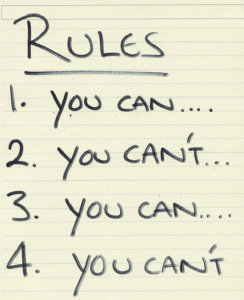For a little context, a few years ago, I wrote a post here at TLNT about how you shouldn’t have a social media policy for your organization. In it, I said:
My point is that however you’d treat the employee in a similar real life situation is how you should treat them when it comes to social media. There are very few truly unique situations when it comes to social media and then it goes back to my point about not making policies for a handful of employees or possibilities.”
And about a year ago, I wrote a post about how these social media disclaimers (i.e. “My views do not represent that of my employer”).
In it, I said:
I’ll tell you what that disclaimer means in the real world: jack squat. Only, at least on Twitter, I never can tell people how ridiculous the whole disclaimer actually is in 140 characters without sounding like a jerk. And also because this statement is ridiculous for a wide variety of reasons, all of which need to be further explained.”
I “will not be signing any … policy”
Trish McFarlane asked me if my views have changed on social media policies in the last few years. Succinctly, the answer is no.
I’m not going to go all, “let’s fight the man” on this one but I, for one, will not be signing any social media policy. I would recommend most people do the same.
Now that’s a bit tougher if it is embedded into a handbook, obviously. As a former HR head, I also wouldn’t necessarily advocate just breaking those rules because social media policies are dumb.
Then again, you should probably break those rules anyway.
What social media policies help with
What I don’t know is if anyone has ever been fired for a pure social media policy violation. I have to believe it is pretty rare. What policies like this help with is:
- Getting people with hard-to-pin-down performance issues on to a performance improvement plan with greater ease.
- Firing people who probably needed to be fired anyway for a variety of reasons.
- Getting people on the boss’ shit list closer to the firing line.
- Firing people who were egregiously awful on social media (who – policy or not – would have been fired anyway).
- Firing people who violated other guidelines already covered (NDAs and confidentiality agreements).
Lets be real, here
If that’s how you want to operate, you can do all of that without a social media policy. In fact, many organizations pull it off with great frequency.
But can we be real? If you’re having issues with people using social media in your organization, a policy is a super ineffective prescription. As I said in my social media post, education should always be the top priority for those who want to be a visible presence online.
And, you should stop hiring people that you would be worried about getting online and actually saying the words that come into their minds.
The was originally published at Lance Haun’s (Life Between the Brackets) blog.
